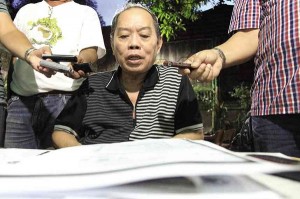
FRANCISCO Matugas, facing a plunder case for alleged pork misuse, holds a press conference Aug. 30 to deny wrongdoing. DANILO ADORADOR III / INQUIRER MINDANAO
SURIGAO CITY—A not-so-intelligent move: convert pork barrel into intelligence funds for local government officials.
In January, Surigao del Norte Rep. Francisco Matugas (1st district) was charged with plunder at the Ombudsman for the alleged misuse of his pork, also known as Priority Development Assistance Fund (PDAF), by funneling at least P64 million to at least 15 towns between 2009 and 2010.
Matugas had earmarked the funds for “intelligence purposes” of 15 town mayors, nine of whom belong to the province’s second district—outside the lawmaker’s jurisdiction. The funds were released in the run-up to the 2010 elections when Matugas’ wife, incumbent Gov. Sol Matugas, was running for governor.
Local intelligence funds are discretionary in nature, and are not subject for audit by the Commission on Audit (COA).
Out of reach by state auditors, pork barrel-funded intelligence funds are even more graft-ridden than those that end up in the hands of bogus nongovernment organizations (NGOs), said Fernando Almeda Jr., one of the six complainants in the plunder charge against Matugas.
“At least with NGOs, you can audit the transactions. You can’t do the same with intelligence funds,” said Almeda, pointing out that local chief executives are only required to submit liquidation reports to the Office of the President.
In his defense, Matugas said the funds were needed so that recipient towns can combat communist insurgents in their areas. He also argued that when he sought a legal opinion from the Department of Interior and Local Government, Undersecretary Austere Panadero found “no legal impediment” to the use of pork as intelligence funds.
State auditors disagreed with DILG’s opinion and in 2010 issued a notice of disallowance against Matugas’ practice of allocating pork for intelligence purposes.
The lawmaker filed an appeal at COA but in a decision released on Sept. 13, 2012, COA affirmed its earlier ruling and maintained that the use of pork as intelligence funds—specifically for counterinsurgency campaigns—is illegal.
COA pointed out that under the General Appropriation Act of 2009 (Republic Act No. 9524), “intelligence purposes” are not among the identified
uses of the pork barrel. It also recommended that Local Government Undersecretary Panadero be held liable for issuing a faulty legal opinion.
A last-termer, Matugas’ name also emerged in the recent pork barrel scam involving the use of billions of pesos that went to bogus NGOs.
A COA special audit report showed that the Surigao del Norte lawmaker had endorsed some P19.8 million to Dr. Rodolfo A. Ignacio Sr. Foundation Inc. (Draisfi), Kabuhayan at Kalusugang Alay sa Masa Foundation Inc. (KKAMFI) and the Philippine Environment and Economic Development Association (Peeda).
COA noted that these NGOs submitted unverifiable lists of recipients, or had listed recipients who denied receiving livelihood projects; had listed nonexistent suppliers, or had listed suppliers who denied transacting with the NGOs; had submitted fake receipts and other questionable documents and had not bothered to provide documents when required by COA.
Matugas has denied any wrongdoing.
The lawmaker insisted that all the NGOs that implemented projects funded by his pork were all authentic and that transactions are covered by documents and receipts.
In a press conference on Aug. 30, he showed certifications that purportedly prove the NGOs that used his pork are not bogus.
Matugas attributed irregular transactions noted by COA to wrong information gathered by state auditors, pointing to the case of Rep. Manuel “Way Kurat” Zamora of Compostela Valley province, who had been tagged as recipient of P3 billion in pork in what turned out to be an erroneous listing by the Department of Budget and Management.